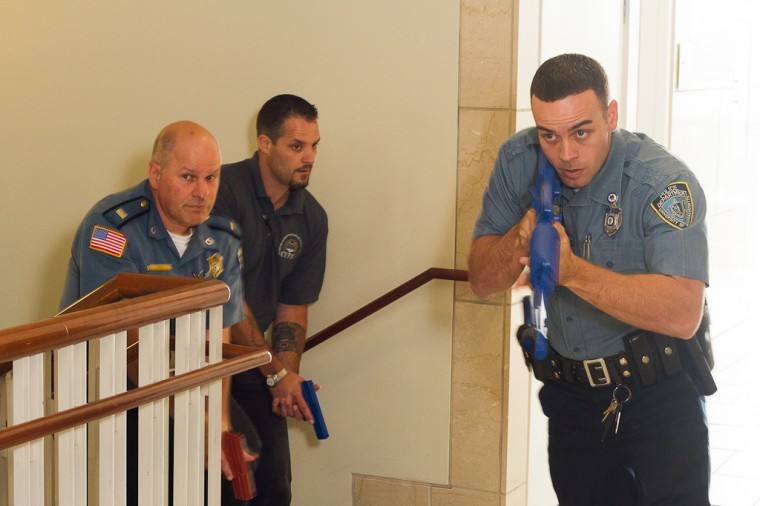“The person that is doing all this is in the ballroom. The only description we have is a white male in jeans. That’s all we got and he is armed. Don’t know with what. That’s all we got. So work your way up tactically. Remember to talk to each other, communicate, and watch your weapon alignment.” Chief Overton gave that information to UMB and UMass Dartmouth Campus police who were participating in an active shooter simulation on Aug. 21.
Four officers armed with plastic weapons assumed tactical formation and began ascending the main stairs of the Campus Center. Upon reaching the 3rd floor, the officers encountered running and screaming actors, “wounded” participants, mysterious bags, and a hostage situation. The premise of the simulation was that these were the first and only officers available to respond to an active shooter on campus.
Three teams of four took turns running the simulation with each scenario varying slightly. This variation from one simulation to another was designed to keep the officers on their toes.
Pierre Salomon is a criminal justice major and has served in the Army since 2009. In one of the simulations, Salomon portrayed a wounded student who informed the officers that the perpetrator left a bag in the room. This was a test of the officers’ recollection of Standard Operating Procedures (SOP).
“Generally you don’t want to open the bag that the bad guys left behind,” Salomon explained. “It could be a bomb or something. None of the officers opened the bag.”
Salomon added, “Even though they had a mix of officers familiar with active shooter scenarios and less experienced officers they worked well together.”
Salomon said his experience added to his confidence in the UMB Police Department. “I feel safer because they are actively training. Some police departments don’t train [in this way]. They just meet the minimal requirements [of the Clearly Act].”
Chief Overton explained that “The campus security act, or Clearly Act, states that you have to do some sort of exercise. That exercise can be table-top discussion or a live drill at least once a year. We decided to do a live drill because we had done a table-top exercise last year, and it is important to me that the officers be as well prepared for this type of situation as possible.”
Overton gave the simulation a B plus overall. Overton had hoped that the Transit Police could be part of the simulation because, he says, it is important to train different jurisdictions together. However, the Transit Police cancelled.
Overton explained the importance of cooperation: “Situations like a school shooting prompt a mass response so you often have different departments working together. As a first responder in an active shooter situation what you do is grab the first three or four guys, because you never want to go into the situation by yourself unless you really have too, and because you have all been trained similarly everybody knows there part in the formation.”
Overton also regretted that more time and attention had not been given to the setting up of the rooms the police were to enter.
In terms of the officer’s response, Overton thought the officers did well but had one criticism. “The big thing that we got on the officers about was communication. We encouraged the actors to yell and try to distract the officers as much as possible. The officers still did pretty well. I just want them to communicate. To talk about what they are doing. One of the teams didn’t say much because they anticipated everything happening on the third floor. They should have been anticipating things coming from anywhere. Because you never know where the shooter has moved to,” Overton said.
Meghan Peel, Adjunct Faculty in the sociology department, portrayed the shooter in the third scenario. Peel said the officers’ performance comforted her. “I think they did a great job in the scenario when I was the shooter because lord knows I wanted to throw the gun down and not get shot,” Peel said.






















































